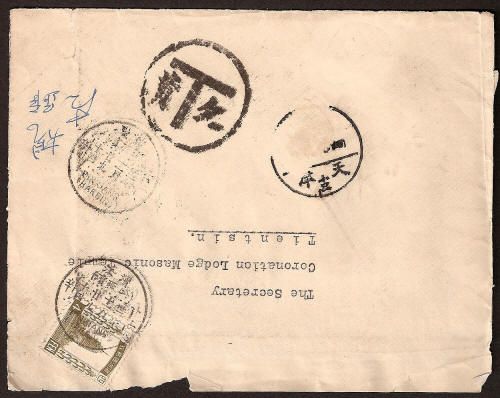 |
||||||||
|
|
Postage Due If a letter or parcel is posted with insufficient postage paid the delivering post office will make a charge, this charge is described as a "postage due" charge. Postage due in China was collected by the addition of Postage Due Stamps added to the envelope. The Chinese charge postage due at twice the standard rate this is to discourage users from sending mail without stamps through the system. To flag-up the fact that postage due was payable they often marked underpaid post with a capital "T" (an abbreviation for the French word Taxe) which is an international postal procedure. From 1932 to the end of 1934 postage due was payable on all mail from Manchukuo to China (even if it did have the correct postage) because Manchukuo, as a state, was not recognised by the Chinese. In fact, the Chinese were legally correct in doing this as Manchukuo had also not been recognised by the Universal Postal Union. This changed when the Sino-Manchukuo Postal Agreement was signed in December 1934 resulting in the issue in 1935 of new "China Mail" stamps, and the abolition of postage due charges on correctly stamped mail from Manchukuo. The postal authorities in Manchukuo did not issue a postage due stamp to collect unpaid postage, instead the post offices would make a charge in the form of a receipt onto which they would attach a normal postage stamp which they would then postmark. These items are rare. The amount charged would again be double the normal cost of posting. |
|||||||
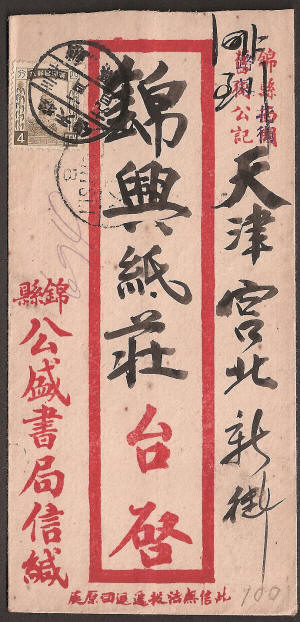
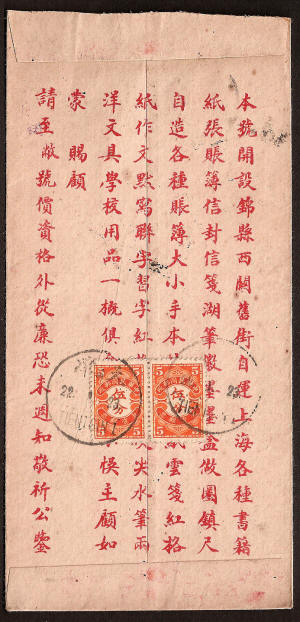 |
||||||||
|
|
||||||||
|
|
Red band letter sent from Moukden on 9th January 1934 to Tientsin in China and stamped with a 4f stamp from the first regular issue, this was the correct rate in Manchukuo. Chinese postage due stamps were added to the value of 10c, (normal letter rate in China 5c x 2). The letter arrived on 22nd January 1934. |
|||||||
|
|
||||||||
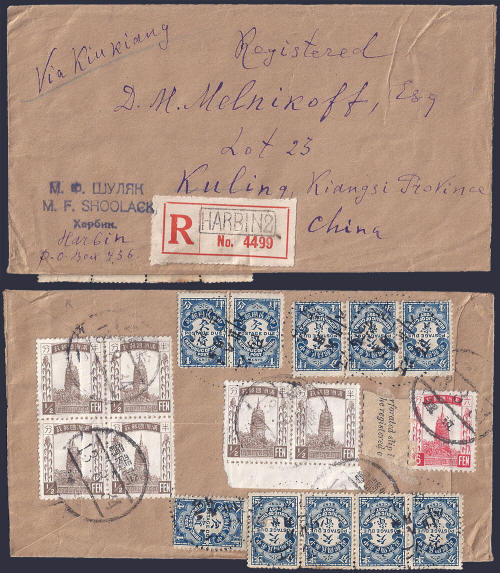 |
||||||||
|
18th August 1934 - This
cover was sent from Harbin by registered post, the sender applied
stamps to the value of 9 fen. This would have been correct for
delivery within Manchukuo, in China however the rate was 5f letter +
8f for registration a total of 13f. Postage due was applied
at Kuling to the sum of 26f (double
the discrepancy). A note requested that the cover travel via 九江 Jiujiang (Kiukiang) in N. Jiangxi province. Kuling (now Lushan) is a nearby small mountain town that at this time was run by missionaries. |
||||||||
|
|
||||||||
|
This is a letter sent from Harbin to Tientsin in China, again with a 4f first regular issue stamp. The letter would have had a single 10c postage due stamp applied but sadly this has been lost, you can see the outline. It does however show a very good example of the capital T postmark which was often applied to signify underpaid or unstamped post. |
||||||||
|
|
||||||||
|
Postage Due Slips |
||||||||
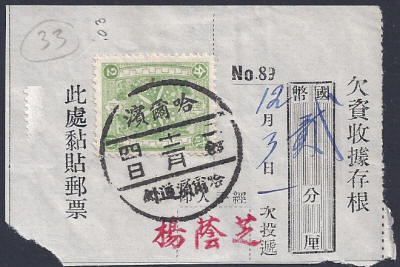 |
||||||||
| This is a postage due slip used to collect fees for insufficient postage. This example comes from 哈爾濱道外 Harbin Daowai Post Office (located in the Eastern part of the Harbin City). In this instance the slip is dated 4th December 1933 and the amount collected 2f. | ||||||||
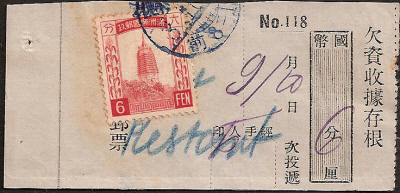 |
||||||||
|
The item shown above is a receipt for postage due dated 1936 and franked with a Harbin date stamp.. The normal letter rate at that time was 3f, so this receipt is possibly related to an item of unstamped mail. The normal practice of charging double the postal rate for unstamped mail would explain the 6f stamp. The writing in blue pencil "Post Restonit" is possible a mis-spelling of "Poste Restante". Poste Restante mail was typically mail sent ahead of a traveller for collection at the main Post Office in the town at the travellers destination. |
||||||||
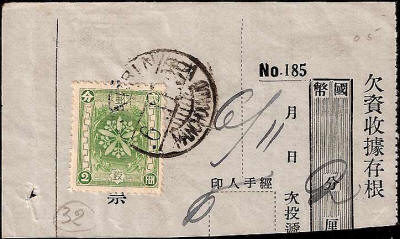 |
||||||||
| Postage due slip for the amount of 2f, maybe due to an underpayment or for an unstamped "local" postcard. Postmarked Harbin 30th November 1939. | ||||||||
|
|
||||||||

